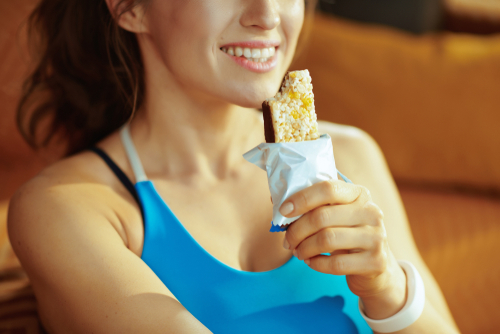Whether you’re aiming to crush a high-intensity interval training session, power through a long run, or find your zen in a yoga class, what you eat before, during, and after your workout can significantly impact your performance, endurance, and recovery. Proper nutrition serves as fuel for your body, providing the energy and nutrients needed to optimize your sweat session. Here’s a comprehensive guide on what to snack on to get the most out of your workouts.
Before Your Workout:
High-Complex Carbohydrates: Before embarking on your workout journey, it’s essential to fuel up with high-complex carbohydrates. These carbs are your body’s preferred energy source and are crucial for maintaining energy levels during exercise. Opt for whole grains like oats, quinoa, or brown rice, which provide a sustained release of energy.
Lean Protein: Including a source of lean protein in your pre-workout snack can help support muscle repair and growth. Choose options like Greek yogurt, eggs, or a protein smoothie with ingredients like whey or plant-based protein powder.
Healthy Fats: Incorporating healthy fats into your pre-workout snack can aid in satiety and provide a steady source of energy. Consider adding avocado, nuts, or nut butter to your meal or snack.
Timing: Aim to eat your pre-workout snack approximately 1-2 hours before exercising to allow for digestion and absorption of nutrients. Experiment with timing to find what works best for your body and the intensity of your workout.
Pre-Workout Snack Ideas:
 Whole grain toast with avocado and sliced turkey
Whole grain toast with avocado and sliced turkey
Greek yogurt topped with berries and a sprinkle of granola
Banana with almond butter
Oatmeal with sliced almonds and a scoop of protein powder
During Your Workout:
Hydration: Staying hydrated during exercise is crucial for maintaining performance and preventing dehydration. Sip on water throughout your workout, especially during intense or prolonged sessions. Consider electrolyte-rich beverages for longer workouts or in hot environments to replenish lost minerals.
Quick Carbohydrates: For endurance activities lasting longer than 60 minutes, consuming quick carbohydrates during exercise can help sustain energy levels. Portable options like energy gels, sports drinks, or dried fruit can provide a quick source of glucose to fuel your muscles.
Electrolytes: Sweating during exercise leads to the loss of electrolytes like sodium, potassium, and magnesium. Replacing these electrolytes during prolonged workouts can help maintain hydration levels and prevent cramping. Look for sports drinks or electrolyte tablets to replenish lost minerals.
During-Workout Snack Ideas:
Sports drink or electrolyte-enhanced water
Energy gel packets
Handful of dried fruit (e.g., dates, raisins)
Banana slices
After Your Workout:
Protein for Muscle Repair: After completing your workout, it’s essential to refuel your muscles with protein to support repair and growth. Aim to consume a source of high-quality protein within 30-60 minutes post-exercise to optimize recovery. Options like grilled chicken, tofu, or a protein shake can provide the necessary amino acids your muscles need.
Carbohydrates for Glycogen Replenishment: Replenishing glycogen stores depleted during exercise is crucial for restoring energy levels and promoting recovery. Including carbohydrates in your post-workout meal or snack can help facilitate glycogen resynthesis. Opt for a combination of complex and simple carbohydrates to replenish energy stores efficiently.
Hydration: Don’t forget to rehydrate after your workout to replace fluids lost through sweat. Aim to drink water or electrolyte-rich beverages to restore hydration levels and support recovery.
Post-Workout Snack Ideas:
Grilled chicken or tofu with quinoa and roasted vegetables
Protein smoothie with spinach, banana, and protein powder
Whole grain wrap with turkey, avocado, and veggies
Cottage cheese with pineapple chunks
Other Helpful Tips:
Whether eating for endurance or snacking for strength training, it’s not always clear what will power your body the best.
Different forms of exercise need different kinds of fuel. Getting the right nutrition can give you an edge, whether competing with others or just with yourself.
Follow these expert guidelines on choosing and timing your snacks to power through your workouts with high-octane energy.
Cardio
If you’re tackling aerobic exercise, like hiking, biking, or high-intensity interval training (HIIT), when you eat is just as key as what you eat.
Also, don’t forget to drink plenty of fluids before, during, and after your workout. Fluids help regulate body temperature and blood pressure and transport carbohydrates, protein, and fats, which your body uses as energy.
According to the American College of Sports Medicine, drink the following amount of fluids before, during, and after exercising:
Before: Drink two to four milliliters per pound of your body weight before working out.
During: Take small sips during your exercise to replenish fluids. In total, aim for 0.3 to 2.4 liters for every hour of exercise.
After: You’ll want to hydrate enough to replenish any body weight that you lost while exercising. To know how much bodyweight you lose, weigh yourself before and after your workout.
Fuel Up
Choose a pre-workout meal high in carbohydrates with some protein, like a peanut butter and banana sandwich. Carbohydrates fuel your exercise, while proteins help prepare your muscles for working out.
Research has found that eating at least four hours before exercise allows your body time to absorb the nutrients that supply energy during your workout.
According to one study published in 2020 in Nutrients, there were no key differences in workout performance when people consumed their pre-workout meals 15–75 minutes or 30–90 minutes before exercise.
However, if you’re working out first thing in the morning, the American Heart Association recommends eating fruit, like an apple or a banana, about five to 10 minutes beforehand.
To see more on this subject, we recommend this great post on Health.com (Only portions were shared above.)
https://www.health.com/fitness/workout-food
